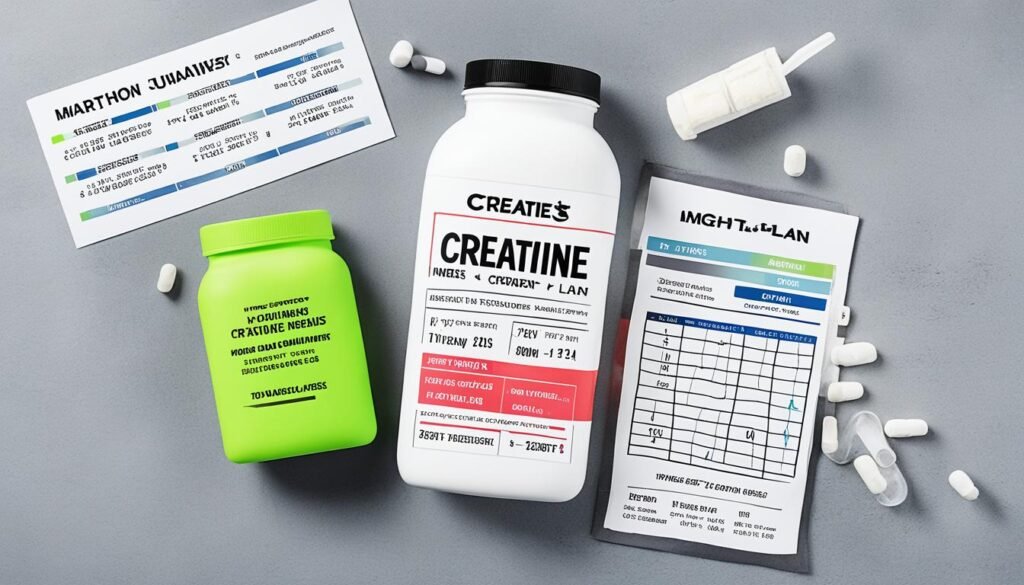Did you know that despite its popularity in strength sports, approximately 29% of track and field athletes use creatine supplementation during their training cycle? As a marathon runner myself, exploring the myriad of supplements aimed at supporting endurance and performance, the persistent question on my mind is how creatine, which significantly enhances strength and power, could be utilized in marathon training for performance enhancement. Indeed, creatine is more commonly associated with quick bursts of activity rather than the prolonged exertion characteristic of endurance runners. Yet, this may not fully capture the potential of a creatine loading phase for marathon runners. It appears that creatine might also have the capacity to delay fatigue and support muscle endurance, which could be game-changers on the long roads of marathon running.
Key Takeaways
- Understanding the potential role of a creatine loading phase in marathon training can be critical for performance optimization.
- A creatine loading phase may aid in increasing muscle power, which is beneficial for producing more force with each stride.
- Creatine supplementation could enhance glycogen storage in muscles, thereby potentially prolonging endurance runners’ peak performance levels.
- Optimizing creatine intake requires attention to dosing and timing in relation to exercise to maximize its benefits.
- While traditionally favored by sprinters, creatine’s emerging implications for marathon runners warrant further exploration and consideration.
Understanding Creatine and Its Role in Energy Production
My journey into the world of fitness supplements led me straight to one of the most widely studied and utilised compounds: creatine. It’s intriguing to break down how this amino acid compound is at the core of the intricate energy systems that fuel our bodies during rigorous activities. Let’s delve into the science that earmarks creatine supplementation as a cornerstone for those seeking to amplify their muscle cells’ energy output.
What Is Creatine and Where Does It Come From?
Essentially, creatine is a naturally occurring substance within our muscle cells, predominantly synthesized in the liver and kidneys from amino acids. It’s also found in dietary sources such as red meat and fish, though often in quantities not sufficient for dramatic performance enhancement. The rise of creatine supplementation is partly due to its capacity to increase the body’s existing stores of this powerful amino acid compound.
The Science of Creatine: Converting to Phosphocreatine for ATP
Diving deeper into the biochemistry reveals why creatine occupies such a significant place in my fitness arsenal. Once ingested, creatine is converted into phosphocreatine, which is stored in the muscles and used for ATP production during high-intensity, short-duration activities like sprinting or heavy lifting. This reaction is critical because ATP serves as the primary energy currency of muscle cells, especially when immediate energy is paramount.
Moreover, the role of phosphocreatine in regenerating ATP is why supplemental creatine can be so effective—it ensures a ready store of energy that’s rapidly mobilizable. The promise of this quick energy turnover is why I, alongside countless others, incorporate creatine into our fitness strategies, looking to push the boundaries of our physical potential.
Creatine’s Renowned Status in the Sports Supplement World
Notions of robust strength and boundless endurance aren’t just fanciful desires when it comes to creatine supplementation—there’s profound science backing its efficacy. Its vaunted status arises from the multiple studies demonstrating its positive effects on strength, endurance, and exercise recovery. This reputation for enhancing performance—as I’ve experienced firsthand—has solidified creatine’s position as one of the most essential supplements in the sports world.
I’ve noticed significant improvements in my training, and the scientific consensus seems to project a unanimous thumbs-up for creatine’s role in boosting athletic performance.
Including creatine as part of a well-rounded diet and training program could be the catalyst that propels you to your next personal best. Its ability to augment muscle cells’ energy is an advantage I find indispensable in my quest for optimal physical performance.
Enhancing Athletic Performance with Creatine

My investigation into the multifaceted benefits of creatine supplementation has revealed its significant impact on elevating athletic performance. Backed by substantial research, creatine is more than just a muscle-building aide; it’s a comprehensive performance enhancer that caters to an athlete’s entire journey from training to recovery and beyond.
Short-Term Benefits: Strength and Power Increases
One of the most immediate effects I’ve noticed with creatine use is its ability to bolster muscle strength significantly. The surge in performance isn’t subtle—it’s a tangible enhancement that translates into increased anaerobic capacity, particularly during high-intensity activities where explosive power is paramount.
Recovery Support: Reducing Muscle Damage and Inflammation
The role of creatine in exercise recovery is another aspect that deserves attention. Post-exercise, it’s not uncommon to experience muscle damage and inflammation, but the integration of creatine into my regimen has noticeably attenuated these issues. By doing so, it facilitates a quicker rebound back into training sessions, setting the stage for consistent performance enhancement.
Relevance of Creatine in High-Intensity Exercises Like Sprinting
It’s in high-intensity, anaerobic exercises like sprinting that creatine truly shines. Its effect on athletic performance, particularly in disciplines requiring short bursts of speed and power, has been impressive. Enhancing anaerobic capacity means that athletes, including sprinters and runners, can deliver a stronger finish—effectively translating every bit of effort into peak performance.
Unpacking the Creatine Loading Phase
As an avid marathon runner, my perpetual quest for optimal performance has led to implementing strategic supplementation plans to ensure my endurance and strength are at their peak. One approach that has garnered significant interest in the running community is the Creatine Loading Phase for Marathon Runners. This phase is critical not just for dosage optimization, but also for achieving muscle saturation that may have a profound impact on my competitive outcomes.
Optimal Practices for Creatine Supplementation
Embarking on a creatine supplementation journey demands a well-thought-out strategy. As I immerse myself in the creatine loading phase, I adhere to guidelines that set the stage for the most effective uptake and utilization of this supplement. Proper hydration and timing in relation to meals and workouts play a pivotal role in maximizing the benefits of creatine.
A Closer Look at Dosage: Loading and Maintenance Phases
The commencement of a creatine regimen often involves the loading phase, characterized by a higher intake, typically 20 grams per day, segmented into four 5-gram doses throughout the day for about 5 to 7 days. Once my muscles are saturated, I transition to a maintenance dose, ensuring that the high levels of muscle creatine are upheld. The maintenance phase could mean consuming around 3-5 grams daily, which effectively sustains the creatine reserves I’ve built up.
Saturation of Muscles with Creatine for Immediate Improvements
To capitalize on muscle saturation, the creatine loading phase holds promise. This concentrated influx of creatine can potentially lead to immediate and noticeable enhancements in my muscle strength and power, qualities indispensable to marathon running. While speed may not be the main selling point for marathoners, the additional power courses through each stride, improving overall efficiency and pace, which can be crucial during those final miles.
Overall, my commitment to adopting supplementation strategies like the creatine loading phase is indicative of a larger dedication to refining all aspects of my training. With diligent application and attention to proper dosage, creatine not only optimizes my performance but also supports my endurance goals seamlessly.
Does Creatine Benefit Marathon Runners?

As I delve further into the exploration of supplementation for marathon runners, the topic of creatine benefits commonly surfaces. To many, creatine is synonymous with weightlifters and bodybuilders, yet emerging research hints at advantages for those who endure the long stretches of marathon running. Let’s dissect some of the proposed benefits that creatine may hold for endurance athletes like myself.
Investigating Creatine’s Impact on Endurance and Recovery
The narrative that creatine is strictly for explosive power might be missing a chapter. Recent studies suggest that creatine benefits could also include enhanced muscle endurance. For marathon runners, this is crucial; it’s the difference between faltering in the final miles and surging across the finish line with strength. Furthermore, creatine is reported to help in the recovery process, potentially reducing downtime between rigorous training sessions and enabling more consistent performance.
Generating More Force and High-Speed Sprinting Abilities
It’s intriguing to consider the potential for creatine to facilitate a marathon runner’s ability to sprint, especially in those vital moments of a race. Although marathons are tests of endurance, having the capability to generate more force can be a game-changer towards the end. With the promise of fatigue delay, it stands to reason that a runner could leverage creatine for those short, high-speed bursts when it matters most.
How Creatine Can Improve Glycogen Storage for Endurance Athletes
One of the lesser-sung verses of the creatine benefit ballad is its relationship with glycogen storage. Glycogen acts as a storage form of glucose, supplying energy during prolonged activities. There’s an allure to the idea that creatine could support enhanced glycogen storage in muscles, thereby providing an extra reservoir of energy for marathon runners. This could potentially preserve muscle stamina and defer the onset of fatigue, a proposition worthy of consideration in any runner’s toolkit.
In conclusion, while the dialogue about creatine typically orbits around power and strength sports, the narrative may be broader for athletes like me, who commit to the long and demanding roads of marathons. The potential for improved muscle endurance, quicker recovery, sustained sprints, and better energy management through glycogen appears promising. As I lace up my running shoes, the prospect of integrating creatine into my training regimen to test these benefits firsthand becomes an avenue worth exploring.
Creatine Loading Phase for Marathon Runners
As I investigate the strategies poised to give marathon runners an edge, the concept of a Creatine Loading Phase for Marathon Runners emerges as a compelling method to possibly boost endurance training. This phase is characterized by a short-term, high dosage of creatine intake, aimed at quickly increasing the creatine levels in one’s muscles, which is theorized to improve muscle power and aerobic capacity.
The logic behind the creatine loading phase is rooted in the desire for enhanced athletic performance. By saturating muscles with this key energy substrate, the body is equipped to re-synthesize ATP more efficiently during prolonged physical activity. Therefore, this could lead to a marathon runner’s ability to sustain higher intensities over the length of a marathon, directly impacting their endurance and overall performance.
| Criteria | Without Creatine Loading | With Creatine Loading |
|---|---|---|
| Time to Muscle Fatigue | Quicker onset | Delayed onset |
| Recovery Rate | Slower recovery between sprints | Faster recovery potential |
| Glycogen Storage | Lower levels pre-exercise | Increased storage capacity |
| Overall Performance | Baseline endurance | Enhanced endurance and power |
By initiating a creatine loading phase, marathon runners are not just prepping their muscles for the impending demand but are potentially setting the stage for a more effective use of their intrinsic energy systems.
I see the process of integrating a creatine loading phase as a dial turning up the capacity of my muscles to perform and endure. The allure of achieving possibly higher thresholds of performance propels my curiosity to integrate this phase into my regimen. As others in the marathon community contemplate this approach, I encourage a balanced examination of both research and anecdotal evidence surrounding the effects of a creatine loading phase on long-distance running.
Side Effects and Safety Considerations of Creatine Supplementation

While my journey with creatine has largely been positive, it’s crucial to acknowledge that, like any supplement, it may introduce creatine side effects. Understanding these and how to manage them is paramount for anyone considering creatine as part of their fitness regimen.
Addressing Gastrointestinal Discomfort and Hydration
Among the concerns, gastrointestinal issues such as bloating and digestive discomfort have been noted. Ensuring proper water intake is vital, especially since creatine can cause water retention. This not only helps in alleviating digestive woes but also aids in maintaining kidney health due to the increased need to process the supplement.
Muscle Cramping and the Importance of Electrolyte Balance
Muscle cramps are another side effect that some creatine users may experience. The cause is often linked to dehydration or imbalances in electrolytes. I make it a point to monitor my hydration status and often include electrolyte-rich drinks in my diet to combat these effects, ensuring my muscles function optimally.
The Debate on Creatine’s Effect on Kidney and Liver Functions
The impact of creatine on kidney function and liver function is often debated. Current research indicates that, in individuals with healthy kidneys and liver, creatine does not inflict harm. However, those with pre-existing conditions should approach creatine with caution, prioritizing consultation with a healthcare provider.
A comprehensive understanding of the potential side effects and how they can be managed or mitigated becomes an invaluable part of incorporating creatine into one’s routine. Below is a table summarizing common side effects related to creatine use and the respective measures one can take.
| Side Effect | Description | Preventative Measures |
|---|---|---|
| Gastrointestinal Distress | Bloating, stomach discomfort, and sometimes diarrhea. | Drink ample fluids, split dosing throughout the day, gradually introduce creatine into your diet. |
| Water Retention | Increased water in the body, potentially affecting weight and appearance. | Maintain hydration, monitor dietary sodium intake. |
| Muscle Cramps | Spasms or tightness in muscles, which can be painful and impede exercise. | Stay hydrated, ensure adequate electrolyte intake, stretch regularly. |
| Concerns on Kidney and Liver Health | Worries about potential strain or damage to these organs. | Consult a healthcare provider before use, especially if pre-existing conditions are present. |
I believe that with careful consideration and responsible use, the benefits of creatine can be safely harnessed to enhance performance and post-exercise recovery. This means not only paying attention to how creatine is used but also to how the body responds to it over time.
Foundational Aspects Before Considering Creatine

As I reflect on the decision to introduce creatine into my fitness routine, I’m reminded that supplementation is most effective when built upon a solid infrastructure of well-established training strategies and effective nutrition. To ensure the success of integrating this supplement, it’s crucial to first adhere to a rigorous training regimen and maintain a nutritional diet that’s tailored to my body’s needs.
Ensuring Effective Training and Nutritional Strategies
Excellence in athletic performance starts with the fundamentals: meticulously planned workout programs and a diet that’s both balanced and specifically designed to fuel the intense demands of endurance training. It’s not just about the miles I log or the weights I lift; it’s also about the protein, carbohydrates, fats, and micronutrients that I consume. My focus is on quality and variety to ensure I’m receiving all the necessary components for recovery and growth.
Why Creatine Should Be an Addition, Not a Foundation
Creatine represents a powerful tool in the arsenal for performance enhancement, yet it isn’t a substitute for the basics. I see it as an extra edge — a supplement that will complement my existing regimen, perhaps giving me that incremental boost in strength and recovery that could be pivotal on race day. But first, my foundation must be rock-solid; only then will creatine serve as an effective ally in my pursuit of peak performance.
Consultation with Healthcare Professionals Before Supplementation
Prior to embarking on any regimen involving supplements, seeking healthcare consultation provides essential insights tailored to my unique health profile. By discussing with healthcare professionals, I gain a clear understanding of how creatine might interact with my body, and how to incorporate it responsibly within my training program. It also ensures that I’m making informed choices, particularly when it comes to dosage and potential interactions with other nutrients or medications.
A detailed assessment of my training strategies, nutritional needs, and personalized supplemental guidance helps me navigate the vast landscape of performance enhancement with confidence and care. Here’s a snapshot of my foundational health and fitness checklist:
| Aspect | Details | Actions |
|---|---|---|
| Training Regimen | Diverse, structured exercises targeting endurance and strength | Ongoing; Adjust as needed based on performance data |
| Nutritional Plan | Macro and micronutrient-rich diet, personalized for energy and recovery | Regular consultations with a dietitian |
| Rest and Recovery | Adequate sleep, active rest days, and recovery modalities | Maintain schedule; Monitor body’s response |
| Healthcare Consultation | Professional advice on supplement integration and overall wellness | Before supplementation; Periodic check-ins |
Ultimately, creatine should be approached not as a magic bullet, but as a considered element within the broader context of my athletic goals and wellness. With the cornerstone of my routine firmly in place, I’m poised to consider creatine as a supplemental companion, confident that I’ve addressed every angle to ensure optimal health and peak performance.
Personalizing Your Creatine Intake

As I delve deeper into the complexities of marathon preparation, I’ve learned that personalized supplementation is not just a buzzword—it’s essential for catering to our unique physiological needs. Understanding that not all runners will respond the same way to creatine intake, my approach has evolved to adopt a more personalized strategy, with my individual performance goals guiding the way.
In practice, this meant starting with a clear definition of what I hoped to achieve through my supplement regimen. For some, the aim might be to increase explosive power, while for others, like myself, it’s about sustaining a robust pace over those taxing 26.2 miles. Recognizing these subtle yet significant differences is the first step towards personalized supplementation that could transform your athletic performance.
To streamline this process, I created a self-assessment framework to gauge my body’s response to creatine. This encompassed monitoring changes in performance during training runs, recovery rates post-workout, and overall energy levels throughout the demanding periods of marathon conditioning. Here’s a snapshot:
| Week | Creatine Dosage | Performance Metrics | Recovery Feedback | Energy Assessment |
|---|---|---|---|---|
| 1-2 | 20g daily (loading) | Increased sprint capacity | Muscles less sore | Elevated during runs |
| 3-4 | 5g daily (maintenance) | Stable pace in long runs | Consistent recovery | Maintained energy levels |
| 5+ | 5g every other day | Pacing improvements | Less fatigue | High energy, less variability |
This personalized approach also led me to collaborate with a nutrition professional to further tailor my creatine schedule to specific phases of my marathon training. Consulting a dietitian helped fine-tune my dosage, ensuring that it complemented the intensity of my workouts without overwhelming my system.
Ultimately, making creatine a tailored part of my nutrition plan, rather than a one-size-fits-all supplement, has been a game-changer for my endurance as a marathon runner. It’s one I highly recommend for fellow athletes looking to cross that finish line with power and pride.
Conclusion
In assessing the comprehensive advantages of creatine for marathon training, my investigation underscores the substantial benefits covering muscle strength, swift recovery, and robust energy storage. Specifically, the creatine benefits summary points to a consensus on creatine’s efficacy in enhancing short-term, high-intensity efforts which serves as an interesting precursor to its potential role in long-distance running. As an endurance athlete myself, the direct feedback from my muscles during intense training sessions further corroborates the scientific findings on creatine’s positive impact.
Summarizing the Benefits of Creatine for Marathon Training
The discussion reaffirms that the strategic inclusion of a creatine loading phase can pave the way for tangible improvements in performance. However, it is paramount for me—and advisedly for my fellow runners—to weigh these benefits with the holistic view of marathon training strategies. Only by doing so can we ensure that supplementing with creatine is not only effective but also harmonious with our overall training blueprint.
Balancing Creatine Supplementation with Overall Marathon Preparation
In my preparations, I’ve learned that a mindfulness toward balance is key; integrating creatine should come with a thoughtful consideration of diet, hydration, training intensity, and rest. This approach allows for an optimized synergy between supplementary and fundamental training elements, maximizing the potential that creatine has to offer without derailing foundational marathon preparation strategies.
Final Recommendations for Marathon Runners Considering Creatine
Finally, my role as both a marathon enthusiast and a purveyor of health insights culminates in these final creatine recommendations: Approach creatine as an adjunct, not a panacea, for enhanced performance; tailor your supplementation plan to fit your personal training regimen and recovery needs; and most importantly, seek guidance from a healthcare or sports nutrition professional to craft a safe, effective, and individualized strategy for incorporating creatine into your marathon journey.
FAQ
What Is Creatine and Where Does It Come From?
Creatine is an amino acid compound that is found in small amounts in certain animal products and is also produced naturally in our bodies. It’s involved in energy production within muscle cells, and supplementation can help increase creatine levels beyond what our diet and body can produce naturally.
The Science of Creatine: Converting to Phosphocreatine for ATP. How Does It Work?
Creatine converts to phosphocreatine in the body, which plays a key role in the formation of adenosine triphosphate (ATP), the energy currency of the cell. During high-intensity exercise, phosphocreatine helps rapidly regenerate ATP, which is necessary for sustained muscle contraction and strength.
What Gives Creatine Its Renowned Status in the Sports Supplement World?
Creatine has earned its reputation in the sports supplement world due to its well-documented benefits in enhancing strength, power, and overall physical performance, especially in short-term, high-intensity activities. Its role in supporting muscle recovery post-exercise also contributes to its esteemed status among athletes.
What Are the Short-Term Benefits of Strength and Power Increases with Creatine?
Supplementation with creatine can lead to immediate improvements in muscle strength and power for athletes. This includes increased force generation, rapid energy production for high-intensity workouts, and the ability to perform more repetitions or maintain higher intensities during training.
How Does Creatine Support Recovery and Reduce Muscle Damage and Inflammation?
Creatine aids in recovery by speeding up the replenishment of ATP in muscles, reducing cell damage, and decreasing inflammatory responses following intense exercise. This leads to quicker recovery times and reduced muscle soreness, enabling athletes to train more effectively and with higher frequency.
Why Is Creatine Relevant for High-Intensity Exercises Like Sprinting?
Creatine is particularly relevant for high-intensity exercises like sprinting because it enhances anaerobic capacity, allowing athletes to perform more powerfully and recover faster between bouts of sprinting. This is crucial for marathon runners who may need to sprint during the final stages of a race.
Optimal Practices for Creatine Supplementation: What Are They?
Optimal practices for creatine supplementation involve a loading phase followed by a maintenance phase. The loading phase typically consists of taking about 20 grams per day for 5-7 days to quickly saturate the muscles with creatine. A maintenance dose of 3-5 grams per day follows to keep creatine stores at the elevated levels.
Can You Explain the Dosage for the Loading and Maintenance Phases?
During the loading phase, a higher intake of creatine, around 20 grams per day in divided doses, is consumed for about a week. After the muscles are saturated with creatine, the maintenance phase requires a lower daily dose, typically 3-5 grams, to maintain high creatine stores. The loading phase is not mandatory; however, it does offer a way to quickly elevate creatine levels in the body.
How Does Muscle Saturation with Creatine Lead to Immediate Improvements?
Saturating the muscles with creatine increases the availability of phosphocreatine, which is vital for the rapid regeneration of ATP during high-intensity exercise. This enhanced energy production can lead to immediate improvements in muscular strength, power, and overall exercise performance.
How Does Creatine Impact Endurance and Recovery for Marathon Runners?
Creatine can enhance muscle endurance by increasing available energy stores, allowing marathon runners to maintain a higher intensity for longer periods. Additionally, its recovery benefits help runners manage the repetitive muscle contractions and stress from long-distance running, potentially reducing muscle soreness and improving subsequent performance.
How Can Creatine Improve Glycogen Storage for Endurance Athletes?
Creatine supplementation may promote greater storage of glycogen in muscles, which is an essential energy reserve during prolonged endurance activities. This added energy reserve can be particularly beneficial during a marathon, where maintaining consistent energy levels is critical for performance.
Addressing Gastrointestinal Discomfort and Hydration with Creatine Supplementation: What Should Runners Do?
To mitigate gastrointestinal discomfort, runners should ensure they stay hydrated and possibly divide their daily creatine doses into smaller, spread out amounts with meals. If discomfort persists, consulting with a healthcare provider for personalized advice is recommended.
How Important Is Electrolyte Balance to Avoid Muscle Cramping with Creatine?
Maintaining proper electrolyte balance is vital when taking creatine, as it can help prevent muscle cramping or spasms often associated with dehydration. Runners should ensure adequate intake of electrolytes, particularly during longer training sessions or in hot weather.
What Is the Debate on Creatine’s Effect on Kidney and Liver Functions?
There is some concern that creatine supplementation may affect kidney and liver function, especially when consumed in high doses or for prolonged periods. However, research suggests that in healthy individuals, creatine supplementation does not have a harmful effect on these organs. Individuals with pre-existing kidney or liver conditions should consult a healthcare provider before taking creatine.
Before Considering Creatine, What Foundational Aspects Should Be in Place?
Runners should have a solid training regimen, a balanced and suitable diet, and proper rest before considering creatine supplementation. These foundational aspects ensure that creatine functions as an adjunct to an already optimized training program, rather than the primary means of performance enhancement.
Why Should Creatine Be an Addition, Not a Foundation, in a Supplemental Strategy?
Creatine should complement, not replace, a comprehensive training and nutritional strategy. It’s meant to enhance an already well-established performance groundwork, providing an extra edge in strength, power, and recovery, rather than serving as the centerpiece of an athletic performance strategy.
Why Is Consultation with Healthcare Professionals Critical Before Starting Creatine Supplementation?
Consulting with healthcare professionals is crucial before starting creatine supplementation to address any potential health risks, individual health conditions, or interactions with other medications. This ensures that the supplementation routine is safe and tailored to the individual’s specific needs.




